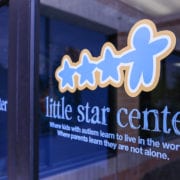Family thankful for Indiana ABA therapy services at Little Star Center
By Clayton Sheese, Little Star Center dad to Jacob, 8
How long has your child attended Little Star Center?
Since March 2011
What has been the biggest challenge in finding services for your child?
Our biggest challenge has been finding insurance coverage for ABA therapy. We were lucky to get a child-only policy from our insurance carrier when Little Star-Lafayette opened — and before the insurer stopped offering such plans. Then, over the years, the premiums increased and we were paying double the original cost.
As Jacob became school-aged, our insurance carrier pushed for him to attend his area school and cut his hours at Little Star in half. We went through all the appeals. The first was handled by Little Star, but was denied. Second appeal also was denied. Shortly after learning a second appeals board overturned the previous decisions, we learned that decision only covered the first appeal, forcing us to begin the process all over again!!! Now, we have to go through the application process every six months.
Jacob is now in school half days. He has settled in pretty well! We feel he needs more time at Little Star in this stage of his life.
How has Little Star Center provided support to your family?
Little Star was there with us through the appeals process, and we are appreciative of that. During the appeals process, Jacob was able to stay at Little Star 40 hours a week! We are very grateful that Little Star found a way for Jacob during our challenges with insurance! We feel ABA is the best thing for Jacob! He has made leaps and bounds!
You could have chosen other ABA facilities for your child. What makes Little Star Center stand out from other ABA facilities?
Little Star was our first choice. We went to Carmel and toured the facility. When the Lafayette center opened, everyone was so helpful and kind!
For what are you most grateful at Little Star Center?
We are grateful for everything Little Star has done for Jacob. He has come so far since he has been at the facility! It has been a long road! We have some challenges ahead, but we know Little Star will be there for Jacob and our family!



